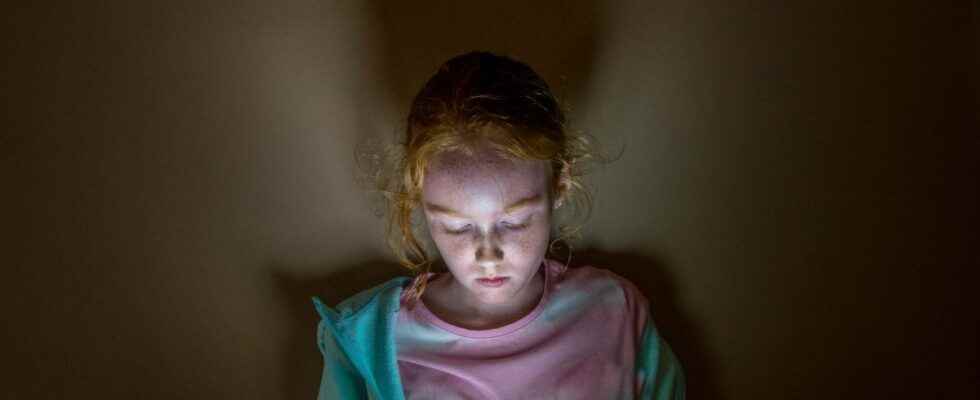Social networks have become part of our daily lives, but we are increasingly wondering about their consequences, especially on the health of the youngest. A study by the Italian Pediatric Society looks back on their misdeeds. What are the risks ? What to do to avoid them? The lighting of Dr Stéphane Clerget, child psychiatrist in Paris.
Facebook, Youtube, Twitter, Instagram, TikTok… Social networks are part of many people’s daily lives and the phenomenon is global. Teenagers, more rarely children, also use – sometimes irrationally – these applications via their smartphone. What are the risks and consequences on their health? A study by the Italian Pediatric Society answers the question.
Determine the effects of social networks on minors
The Italian researchers’ conclusions are based on a meta-analysis carried out by compiling the results of 68 studies conducted between 2004 and 2022.
The objective of all this work was the same: to determine the consequences of the use of social networks among minors. The interest of bringing together so many studies on such a large gap also makes it possible to realize the differences before and after the Covid-19 pandemic.
Children victims of “social depression”
Physical disorders such as headaches, visual and postural disorders, “textual” thumbs are mentioned in the conclusions of this work. “This type of physical disorder is actually observed during too much screen consumption. I’m surprised they don’t talk about myopia, which is quite often accentuated also in these cases“says the child psychiatrist.
In addition to the physical disorders, other conclusions are drawn. Nearly twenty studies evoke an association between social networks and depression. The most serious being the link between the two: the more time children spend on social networks, the more likely they are to develop depressive symptoms or a “social depression” as the researchers call it. For Dr. Clerget, this is true in both directions: depressed and anxious children “consume more screen time too“.
Increase in suicidal ideation
“The symptoms that surprised the most in relation to the use of social networks are those of anxiety and depression. The same symptoms that we had found in another of our studies carried out in the first phase of the pandemic; a study which had recorded an 84% increase in emergency room admissions of young and very young people for neuropsychiatric pathologies, in particular suicidal thoughts (+150%) and depression (+115%)” explains Dr. Elena Bozzola, National Councilor of the Italian Society of Pediatrics.
“Indeed, more screen time means less parenting time or time with friends, doing other things, which promotes isolation and the consequences that can have.” supports Stéphane Clerget
Excessive use of social networks among young people
By looking for the causes of such a situation, pediatricians arrive at the same conclusion: the excessive use of these tools is in question. Worse, they believe that these virtual contacts end up replacing real, face-to-face interactions. “Depression is linked to the rapid rise of digital communication and virtual spaces replacing face-to-face contact with excessive use of smartphones and online chats“, continues Dr. Bozzola. “Children and adolescents most often surf the Internet alone, assiduously consulting social media”.
For Dr. Clerget, this is where the role of parents comes in. “They must absolutely limit screen time with their children and encourage them to practice other activities, not necessarily in contact with others, it can be reading, but away from screens” insists the child psychiatrist.
Social networks: risk of eating disorders?
Anxiety disorders or depression are only part of the problem. Among other health consequences, eating disorders figure prominently. Indeed, children, through social networks, are more exposed to brand marketing and therefore tempted by unhealthy foods but also to potential messages from pro-anorexia people.
A parallel has also been drawn with the distortion of one’s own body that the youngest can suffer, who are 30% at “edit a photo before posting it online” reveals the analysis again.
Finally, among the dangers mentioned by the researchers are those related to the sexual sphere, such as exposure to inappropriate content or “bad encounters” with sexual predators or pedophiles. “We feel safe, talking with a stranger, because when we do, we are at home. It gives a false sense of security, especially to younger people.” adds Dr. Clerget.
Problems from the age of 8
We often think of teenagers when we talk about social networks, but according to Dr Bozzola “these risks are seen in children as young as eight years old“.
Moreover, even if the disorders do not manifest themselves immediately, children overexposed to social networks also have a greater risk of depression, malaise and anxiety in adolescence.
Train pediatricians to warn parents
By publishing this work, the aim of the Italian Pediatric Society is to help parents. Based on the results of one of the studies, Dr. Bozzola recalls, “a minimum of motor activity, even in already depressed subjects, made it possible to reverse the symptoms“. Even if the child or adolescent is reluctant, take them for a walk in the fresh air.
But before even getting there, the goal for pediatricians is to train their colleagues to alert and educate parents about the first signs of discomfort: “Often, in fact, parents realize late that there is a problem. It is important that paediatricians can give indications on the behaviors that should not be neglected in children and young people: for example, if they begin to refuse certain foods, if they become more closed and irritable, if they do not want not go out with their friends and spend more time in front of screens. Spotting the signs in time helps prevent the situation from spiraling out of control.” she concludes.
